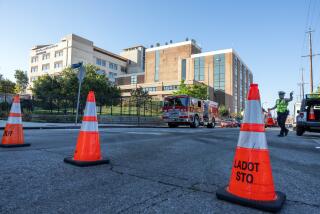Dehydration cited in death of woman in S.F. hospital stairwell
SAN FRANCISCO -- A long-awaited medical examiner’s report released Friday offered new details on the death of a woman who disappeared from her San Francisco General Hospital bed and was found in a nearby exterior stairwell 17 days later.
But the key question of when Lynne Spalding, 57, died remains unanswered.
The report lists the cause of Spalding’s death in the stairwell of the sprawling public hospital as “probable electrolyte imbalance” -- or dehydration -- with “delirium” attributed to clinical sepsis, the body’s often deadly response to infection. The report attributes those conditions to complications of “chronic ethanolism,” or alcoholism.
Though it notes that Spalding’s body had suffered “moderate decomposition” when discovered during a routine quarterly maintenance inspection of the stairwell, it does not estimate the date or time of her death.
The disturbing case has led to changes in the way the San Francisco Sheriff’s Department patrols the sprawling public facility -- the sheriff last month detailed a series of errors that contributed to a botched effort to locate her -- and has spurred numerous internal and external investigations of hospital practices.
Spalding, a vivacious British-born mother of two who had worked in San Francisco’s travel industry, was admitted Sept. 19. She’d been experiencing delirium and weight loss and was diagnosed with a urinary tract infection.
Hospital personnel checked her regularly. But on Sept. 21 she disappeared from her room and apparently exited a door to the rarely used stairwell. Spalding, whom the report states was wearing her street clothes and still had electrocardiogram pads on her torso and intravenous access lines in her arms, was not found until Oct. 8.
Though she is white, Spalding was initially described to law enforcement as African American and wearing a hospital gown. Regardless, sheriff’s officials did not consider her a missing person because she was not on a psychiatric hold and did not launch an active search until pressed to do so several days later.
Only some of the stairwells on the 24-acre campus were checked. The one where she was found was not, Sheriff Ross Mirkarimi said last month.
The report released Friday notes that Spalding had her wallet and keys with her and was wearing a black shirt and pants, black and white jacket and black boots. It also states that Spalding was experiencing a “history of continued confusion/delirium, not understanding why in hospital (disoriented to date and time, oriented to self and place.)”
Family spokesman David Perry said Spalding’s next of kin -- her son and daughter -- learned of the medical examiner’s findings late Friday from the media, as did he and other close friends. He called the move “incompetent” and disrespectful on the part of the medical examiner’s office, which could not be reached for comment Friday.
Perry also said that “any insinuation that some preexisting condition caused the death of a woman who was left abandoned on a stairwell for 17 days without food or water is like accusing a rape victim of deserving what she got. It’s outrageous.”
Spalding’s loved ones have been “begging” for the report for more than two months, said Perry, but he said they would have preferred it to be “complete.”
“The only issue is the date and time of Lynne Spalding’s death,” he said. “If Lynne Spalding died anything more than an hour or two after she went missing on that stairwell, the cause of death is not some scientific term. It is neglect and malfeasance on the part of San Francisco General Hospital and the San Francisco Sheriff’s Department, which was charged with searching for her. “
San Francisco General Hospital Chief Executive Sue Currin in a statement late Friday called the death of Spalding “a horrible event that should never have happened” and said the facility has been “doing everything we can to learn the facts and to ensure that it never happens again.”
“We have not yet had a chance to review the report, but we hope that it can help the family and hospital better understand what happened,” she said. “Although the picture is becoming more complete, we may never know everything about this tragedy, and questions may continue.“
ALSO:
Man’s car containing his wife’s ashes is stolen at carwash
Cal Poly San Luis Obispo is latest campus to report meningitis case
Ronni Chasen autopsy report reveals early police account of her death
Twitter: @leeromney
lee.romney@latimes.com
More to Read
Start your day right
Sign up for Essential California for news, features and recommendations from the L.A. Times and beyond in your inbox six days a week.
You may occasionally receive promotional content from the Los Angeles Times.







